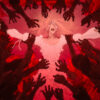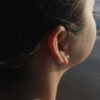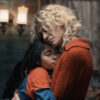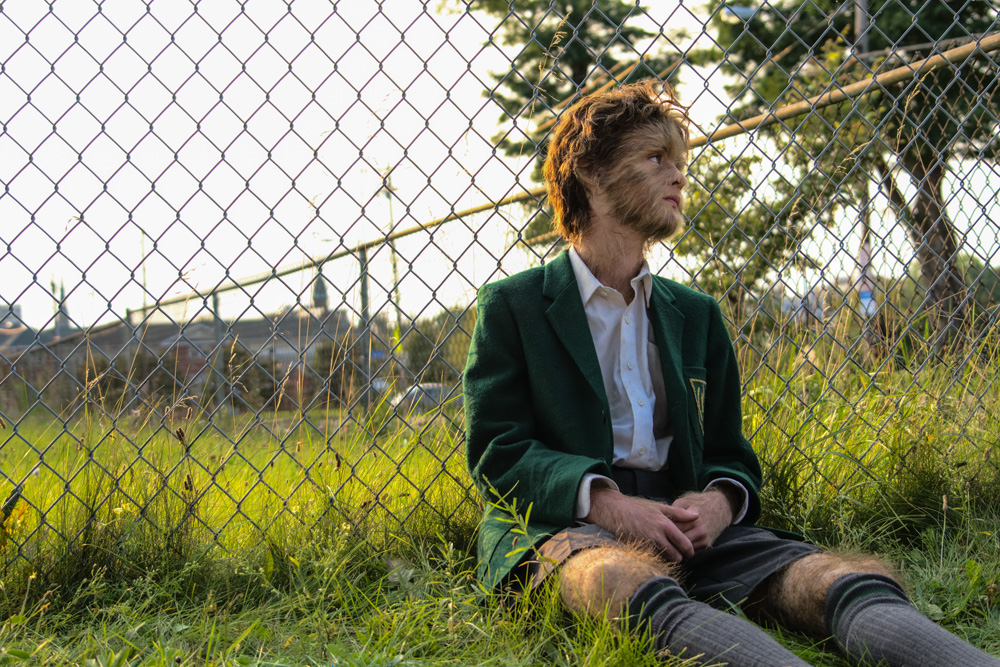“Every child is like a beautiful musical note,” says a video beckoning new students to Bishop Griffin, a fictional school for students of unconventional appearance in “The True Adventures of Wolfboy,” the last place Paul (Jaeden Martell), the teen of its title, wants to go. Protesting to his father (Chris Messina) that “I don’t want to meet people like me because I hate me,” the unusually hirsute young man is driven out into the wild, though for him that looks a lot like the reality that much of the world walks out into every day in the fantastical coming-of-age story penned by Olivia DuFault where life in the Northeast is particularly chilly for Paul when he can’t bear to show his face in public. He’s hardly alone in feeling different from others as he hits the open road, but then again in “The Adventures of Wolfboy,” there’s the growing recognition that holding onto his individuality is what can actually bring him closer to others of similar distinction as he bands together with a self-styled mermaid who performs as a singer (Sophie Giannamore) and an eyepatch-wearing hooligan who fashions herself as a pirate (Eve Hewson) to escape the evil clutches of Mr. Silk (John Turturro), the rare person who at first would seem to value the extraordinary nature of Paul’s physical appearance, only for him to discover that it’s strictly financially-motivated as an attraction for his carnival.
“The True Adventures of Wolfboy” is DuFault’s first feature and while that would be a milestone enough for the playwright-turned-screenwriter, who has gone on to become a in-demand writer/producer on shows such as “Legion” and “Preacher,” the film is particularly poignant when it was developed over the same time that she was transitioning into being a woman. While the theme of embracing one’s natural identity rather than running away from it comes to the fore, so to does DuFault’s inherent ability to bring out little bits of magic in the people and places we pass by everyday without giving much of a second thought to what’s going on inside of them and with director Martin Krejcí creates a refreshingly small-scale fairy tale that’s setting in the real world opens up the possibilities of there being so much unknown left to experience just within our reach. After premiering at the Karlovy Vary Film Fest last year, the film is making its way into homes everywhere this week with a digital release and DuFault spoke about how she infused “The Adventures of Wolfboy” with a personal touch, the science lesson that she took inspiration from after thinking it’d never be applicable to a career in the creative arts and finding fantasy in the everyday.
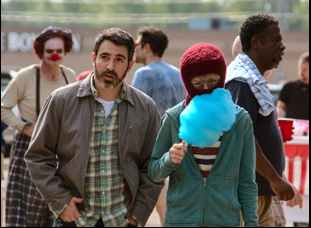 How did this come about for you?
How did this come about for you?
It’s a long story, which begins a decade ago when I was 22, and it was my final semester in college. I waited until the last moment to take the requisite science course that I needed to graduate and I ultimately ended up taking a genetics class, which I thought would be completely inapplicable to my life. We ended up having a Powerpoint presentation on untraditional genetic conditions which are passed down and there was a brief slide — it couldn’t have been more than a minute long — on this condition hypertrichosis where individuals grow excessive hair all over their body. It’s where many people believe the Wolfman myth originates, and immediately, I was pretty struck by it. I’ve always been pretty interested in the intersection between the mythological and the mundane, so having this condition that was the root of all this mythology got my brain working.
I really didn’t begin writing the script or pursuing this idea until about three years later, and part of what always interested me about this conceit behind “Wolfboy” is it’s an allegory that could apply to anybody who feels like an outcast. The hair on Paul’s face can be seen as representative of anyone’s internal self-doubt or what makes them different from what’s conventionally accepted in society. So it was important for me to have a more general allegory that people could connect to, but simultaneously at that time, I was dealing with a lot of gender dysphoria. I was reaching a point in my life where I recognized that I needed to transition in order to survive as a human being, so the film was very specifically written as an allegory for addressing my own feelings as a trans woman, discovering the internal fortitude and resilience necessary to come out and begin the process of transitioning. That’s easy to say and relatively easy to write about, but challenging to do as a human being.
As a screenwriter, was it a challenge to find parallels in reality that had magic in them, but were firmly grounded in this world?
Some parts came easier than others in relation to that. From the very beginning, I knew that I wanted to have this Wolfboy meet a young trans girl who could serve as a source of inspiration. I’ve found mermaids very appealing my entire life — I was pretty obsessed with “The Little Mermaid” when I was younger — so that analog came easily. There were other things that came later on in the process like the Pirate Queen — that took a bit of figuring out. But I love fairy tales. “Pinocchio” was a major source of inspiration for the structure, and I had been reading that a lot recently, and my brain already goes to fantastical analogs and juxtaposition between reality and fantasy, so I found that the more I wrote, the more I was able to find little moments to connect reality, from the Pirate Queen’s eyepatch to end of the film, which I don’t want to spoil, but was another one that surprised me as I was writing it with how easy it was to figure out a fantastical analog to fit the ending characters that we meet.
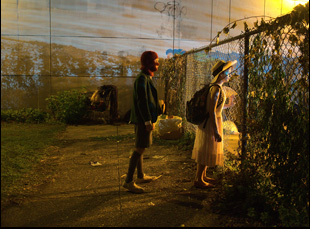 When it’s a road trip movie, did you have ideas for the places they’d hit along the way?
When it’s a road trip movie, did you have ideas for the places they’d hit along the way?
Yeah, I was partially interested in making it a road trip movie because I come from theater and with plays, it’s notoriously hard to make anything in the road trip genre, which is a genre I love. I just love being able to see a variety of locations and having a sense of travel. The comic book “Y: The Last Man” was an inspiration, being a bit of a road trip comic book, and I was thinking specifically of the more run-down elements of upstate New York as being an interesting location to have all of this occurring, just the opportunity to see the world through that kind of semi-skewered perspective that we view the characters through, ideally highlighting different fantastical elements of our reality that we might more easily overlook in our everyday lives.
This hits such a sweet spot for me as far as being adult fantasy that’s mature rather than dark – were you being pushed to go in a family friendly direction or to make it darker?
Fortunately, people were pretty onboard from the beginning in terms of the tone. I thought a lot about some of the movies I loved from my childhood that had darker and more sinister elements [such as] “Goonies” to “The City of Lost Children,” which is another point of inspiration. I think that kids really like films that challenge them intellectually or emotionally and in terms of things that could potentially be frightening that they couldn’t see otherwise. I think that a lot of times family-friendly television or films can be defanged and I just wanted to put some Wolfboy fangs on this film. [laughs]
Was it much different from working in the theater?
Yeah, I love working in different mediums and while I began writing “Wolfboy” when I was still predominantly a playwright, a lot of what excited me were the things that could be done in film and television that you can’t do in theater – for example, the illustrated title cards were a conceit that I came up with pretty early on, just because I wanted something that could be effective in film and television that would never be able to function in the theater.
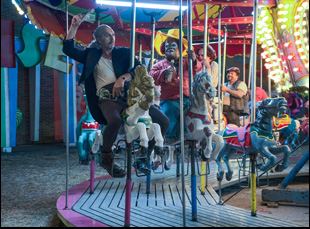 Those were so cool. Did you have a say in the artist for that?
Those were so cool. Did you have a say in the artist for that?
Yes, I loved the artist. I’m a big fan of Arthur Rackham and of fantasy illustrations. That was one of the first ideas that I came up with for the film was these title cards and it was definitely inspired by Pinocchio. The book is sitting on my bookshelf and it has these beautiful illustrations in front of every chapter and I thought, “Oh, I just want to stare at these all day, so I wanted to do the same for audience members.”
From what I understand, this wasn’t just handing in a script, but you stayed involved in the production…
For about two weeks prior to shooting, I was there on set. Specifically, I talked a lot with the two young actors Jaeden Martell and Sophie Giannamore and we went through the script and I made some alterations based on them as human beings and just the way they connected and related to the characters, which was tremendously fun and one of the most rewarding parts of the process.
Obviously, the young trans character played by Sophie must’ve particularly important to you. What was it like connecting with her on the character?
Sophie is one of the most resilient, intelligent young people that I’ve met, and this was her first major film role and you would never really think it because she was so effortless in terms of her acting ability and her presence on set, so it was a real pleasure getting to know her and her family. We were able to discuss a lot about our shared trans experience, both working in Hollywood and just growing up in different time periods. She’s someone who I continue to see today and it is a relationship that I really value in my life.
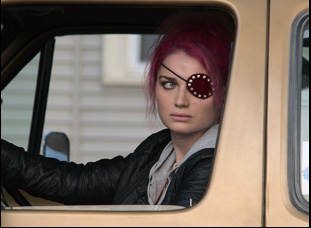 What was it like to step on set for the first time and see the world that had been living in your head come out in reality?
What was it like to step on set for the first time and see the world that had been living in your head come out in reality?
Very surreal. I’ve been lucky enough to produce a lot of the television episodes that I’ve written, so I’ve become a little accustomed to it now, but it’s just tremendously surreal and also humbling to see so many people who are engaged and collaborating together to create this creative vision that is more than simply what you initially imagined. That was what was so beautiful was all of these different thoughts and perspectives and attitudes coming together with a great deal of passion and creativity, creating something which I would never be able to envision individually but ultimately is greater than the sum of all its parts.
What’s it like to get out into the world?
It’s similar to the process of making it. It’s surreal, but I feel very fortunate. We’re in a very interesting, precarious place as a country right now and I feel honored that the film gets to, ideally, contribute to the national conversation, especially in terms of representation for trans people where I think trans people have so much to gain and so much to lose in this upcoming election. Trans visibility has never been more important and I’m really grateful to have the opportunity to be able to contribute to that during this time. I also think it’s a really traumatic time, especially for marginalized people, and this film was partially written to help me through my own personal trauma I was experiencing, so I’d love for the film to be able to be a balm for what other people are experiencing through these really challenging times. It’s nice to have a bit of a feel-good movie to counteract the endless, endless parade of misery that marches across our news feeds.
“The Adventures of Wolfboy” opens in virtual cinemas on October 30th.
